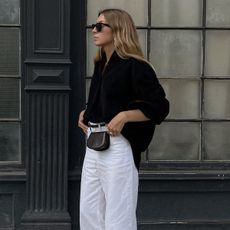Can Collagen Supplements Really Give You Better Skin? Experts Sound Off
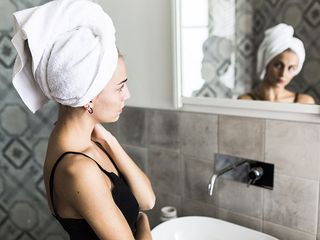
Fact one: We first reported on the skin benefits of collagen a little over three years ago, which may as well be 10 or even 15 when it comes to the editorial and wellness communities. Fact two: Most trendy diet and supplement trends within the wellness community eventually become obsolete—and usually, pretty quickly. However, in collagen's case, its popularity has only seemed to gain momentum.

That being said, just because a trend or supplement has increased in popularity and recognition doesn't necessarily mean it's 100% legitimate. (Remember when we thought high-fat foods were bad for us?) So we thought we'd revisit the topic with some fresh perspective. Since everyone and their mother seems to be touting the magical benefits of collagen supplements (including ourselves!), we wanted to double-check with a couple of sources. We may be noticing some amazing benefits and beauty perks after incorporating collagen into our diets (I'm personally dedicated to blending it into my morning almond milk, cinnamon, and cold brew situation), but we also had some questions. For instance, why is collagen considered to be such a holy-grail source of protein and nutrients, why and how has it quickly risen to such a cult-level status, and perhaps most importantly, will it really make our skin prettier? Keep reading to learn all about collagen and what experts think about its purported skin and health benefits.
The Edge + Benefits
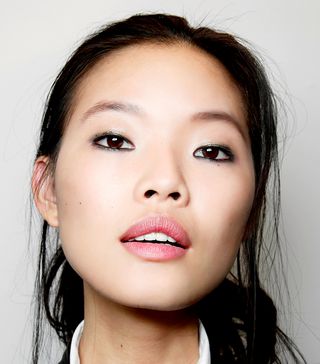
As holistic nutritionist and founder of Kore Kitchen Meryl Pritchard explains, collagen is an essential protein that serves as a natural building block within our bodies. "It basically holds us all together and is found in our bones, muscles, skin, and tendons, adding strength and structure. As we get older, collagen gets depleted, which is why we start to notice a lack of elasticity and an increase in things like wrinkles and lines." Plus, she adds, outside factors like sun, smoking, and sugar can also inhibit collagen production.
But what exactly is it about collagen that makes it so different than other proteins and more specifically, why is it such a supposed skin savior? According to the director of education at Vital Proteins Traci Mitchell, collagen has a few special properties that make it a preferred source of protein for our bodies.

"The primary difference between collagen protein and other proteins is the amino acid profile. All protein contains amino acids that our bodies use to rebuild and restore. However, collagen is unique in that it contains higher levels of three important amino acids: proline, hydroxyproline, and glycine—all of which play an important role in helping to revitalize your skin, hair, nails, and joints. Additionally, it's great for gut and bone health," Mitchell explains.
But because collagen is a naturally occurring substance within our bodies and we can't naturally regenerate it after it's become depleted, supplementation is key. "It's important to supplement with collagen to support and maintain what's already there," Mitchell says. "Approximately 70% of the protein in our skin is collagen, helping spur collagen synthesis, and therefore making collagen the preferential vehicle for healthy skin, hair, and nails. This foundation helps keep these aspects of our body elastic, hydrated and strong. Plus, since it's found in our connective tissue as well, including our gut, collagen can be very beneficial for people hoping to improve their digestive health."
Why Now?
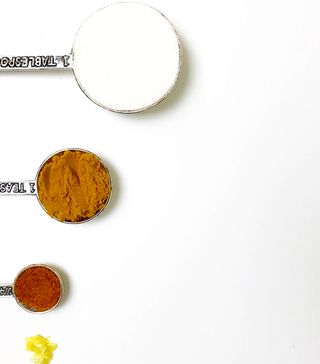
So if collagen is such an essential aspect of our overall health while also presenting some major perks where our appearance is concerned, why are we just hearing about it now? (And by "now" we mean within the past few years.)
"Collagen, itself, certainly isn't anything new to our diets, as it's always been present in many favorite foods, like homemade chicken soup, but the main idea is that there has been a lack of education around collagen protein and its importance to the overall health of our bodies. Recently, its popularity has helped shed light on its benefits and why our bodies need it," iterates Mitchell.
And largely, we have amazing brands like Vital Proteins (which is dedicated to superior sourcing, quality, etc.) to help spread the word. "We're lucky that we have so many innovative companies these days that are making easy-to-use versions of these great supplements," Pritchard continues. "[They offer] options not only from the traditional bovine source but also in the form of Marine Collagen Peptides, which is derived from fish scales. This is a great alternative for people like me who don't consume products from cows." And really, that's just the tip of the iceberg, as the brand also offers plenty of other flavored and unflavored goodies like coffee creamers, whey-based protein powders, bone broths, supplements, and more—all, of course, infused with your daily quota of collagen.
Vegan? Fear not, as there are still other easy ways to incorporate the substance into your routine. "While collagen is mainly sourced from animals, there are some vegan alternatives on the market such as this one from the Beauty Chef," recommends Pritchard.
How to use
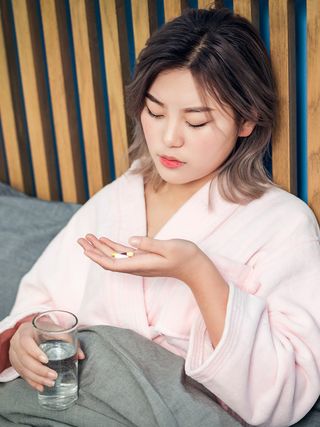
"Everyone's body is different, but because collagen is simply a protein that's already naturally occurring in our body, it's widely considered a safe supplement," Mitchell says. And luckily, there are plenty of different ways you can take the supplement to reap all the internal and external benefits. According to Mitchell, it's just as effective to supplement with capsules as it is with powders. Or even just regularly including collagen-rich foods (think bone broth and eggs) can have major benefits. Just make sure you make it a daily habit, otherwise, you probably won't notice much of a difference. "Like any other supplement, taking collagen consistently is the best way to see benefits." However, as with any new supplement, we recommend doing your research and talking with your go-to medical professional prior to starting a new routine. And as Mitchell says, the serving size, frequency of supplementation, and type of collagen taken may vary from person to person.
"I tend to bake with it, and I also love to add it to soup recipes. I'll also add the collagen peptides to my morning and evening tea," explains Mitchell. "Our customers love adding collagen to their coffee, which actually spurred the development and launch of our dairy-free Collagen Creamers. They've been a tremendous hit!"

Pritchard's also a fan of mixing collagen into a few of her everyday staples: "I prefer to blend it into my morning shakes or tonics for breakfast or my post-workout shake. It's easy to sneak in and provides a little creamier consistency. I have one scoop one to two times per day." See below for her go-to collagen-infused morning tea tonic. (We'll be blending up ASAP!)
Ingredients:
1 cup gynostemma tea (hot)
1/2 cup vanilla cashew milk
1 tbsp. ghee
1 scoop Vital Proteins marine collagen
1 tsp. ashwaghanda
1/2 tsp. eucommia bark
1/2 tsp. rhodiola
1/2 tsp. he show wu
1/2 tsp. polysaccharis ant
1/2 tsp. mucuna pruriens
1 medjool date or 1 tbsp. raw honey
Directions:
Blend it all together until it's frothy, pour into a mug, and sprinkle with cinnamon.
Shop Our Favorite Collagen Products
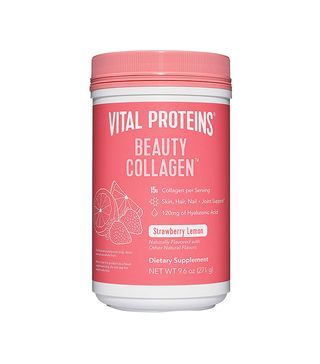
You get 15 grams of collagen per serving with this supplement. It supports hair, skin, nails, and joints. Plus, it contains hyaluronic acid to promote moisture and elasticity.
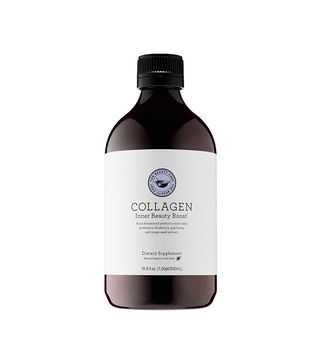
Formulated with probiotics, maqui and acai berries, and grapeseed extract, this elixir supports collagen production and radiant skin.
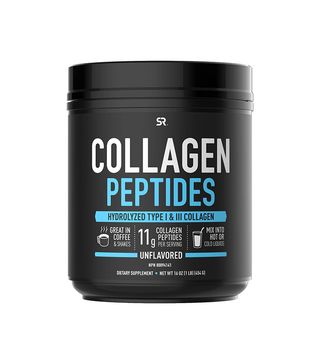
You can add this powder to water, oatmeal, yogurt, soups, or sauces.
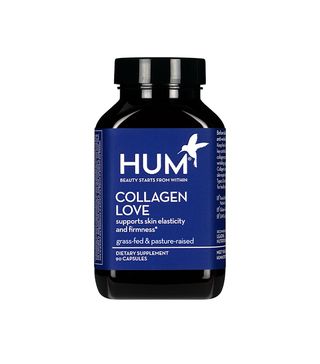
This supplement also contains hyaluronic acid to hydrate and firm. It's recommended to take three capsules a day, and you can expect results in four to six weeks.
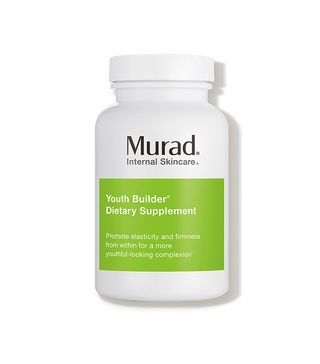
The grape seed extract in this supplement stops the breakdown of elastin and collagen, and vitamin E guards against free radicals.
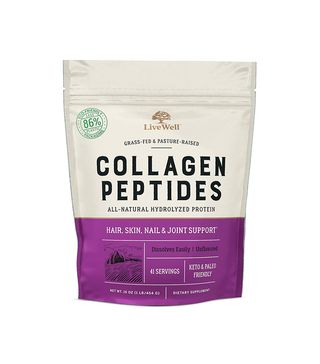
This collagen supplement supports bone, joint, hair, skin, and nail health. It also promotes a healthy gut.
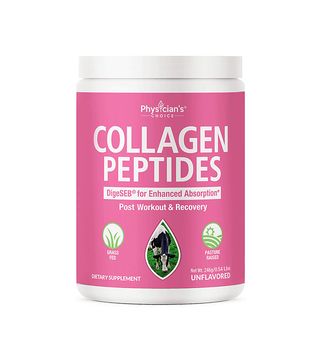
Formulated for quick and effective absorption, this powder contains 14 essential amino acids. You can also use it for post-workout recovery.
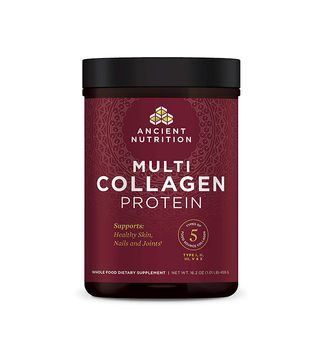
This powder is made of a blend of bovine, fish, and eggshell collagen peptides. In one serving, you'll get 9 grams of protein, 10.2 grams of collagen, and 35 calories.
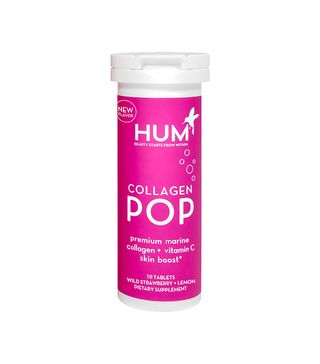
Add this dissolvable tablet to a glass of water to improve your skin's hydration, elasticity, and firmness. It also gives a boost of vitamin C.
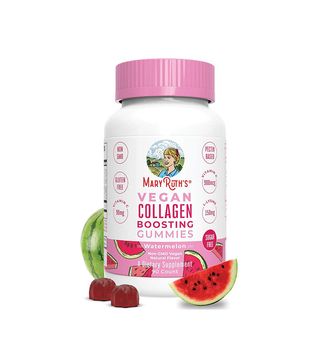
These vegan watermelon-flavored gummies has nutrients like L-lysine, amla fruit, and vitamins A and C. They don't contain collagen, but they improve collagen production.
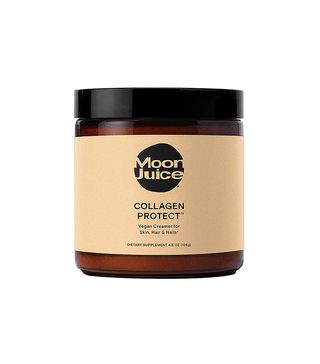
Add this vegan creamer to coffee, tea, or smoothies. It contains silver ear mushroom, tocos, and hyaluronic acid to promote collagen production and hydrate.
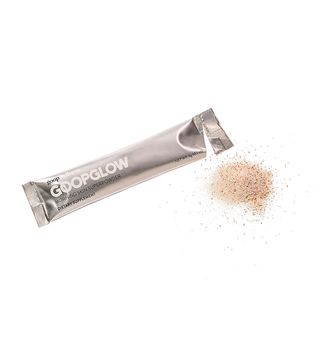
Mix this citrus-flavored powder into eight ounces of water for glowing skin. It contains six antioxidants: vitamins C and E, CoQ10, grape-seed extracts, lutein, and zeaxanthin.
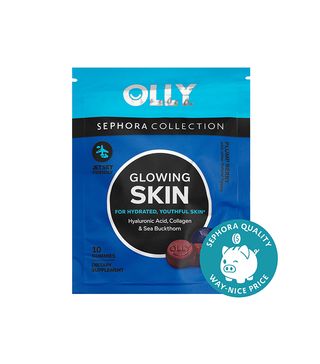
Take two of these gummies daily—they're formulated with hyaluronic acid, collagen, and sea buckthorn to support skin health.
Next up: These Are the Vitamins You Should Be Taking in Your 20s and 30sThis article was originally published at an earlier date and has since been updated.
Disclaimer
This article is provided for informational purposes only and is not intended to be used in the place of advice of your physician or other medical professionals. You should always consult with your doctor or healthcare provider first with any health-related questions.
Erin has been writing a mix of beauty and wellness content for Who What Wear for over four years. Prior to that, she spent two and half years writing for Byrdie. She now calls Santa Monica home but grew up in Minnetonka, Minnesota, and studied writing, rhetoric, and communication at University of Wisconsin, La Crosse. She studied abroad in Galway, Ireland, and spent a summer in L.A. interning with the Byrdie and Who What Wear family. After graduating from UW, she spent one year in San Francisco, where she worked as a writer for Pottery Barn Kids and PBteen before moving down to L.A. to begin her career as a beauty editor. She considers her day-to-day beauty aesthetic very low-maintenance and relies on staples like clear brow serum (from Kimiko!), Lawless's Lip Plumping Mask in Cherry Vanilla, and an eyelash curler. For special occasions or days when she's taking more meetings or has an event, she'll wear anything and everything from Charlotte Tilbury (the foundations are game-changing), some shimmer on her lids (Stila and Róen do it best), and a few coats of the best mascara-type product on earth, Surratt's Noir Lash Tint.
-
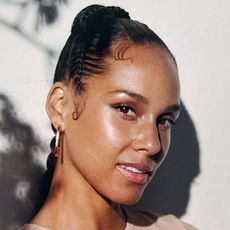 Skin Tints Are Trending on TikTok—IMO, This One Outshines Them All
Skin Tints Are Trending on TikTok—IMO, This One Outshines Them AllIt goes more than skin deep.
By Emma Walsh
-
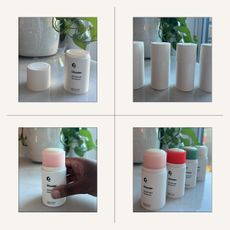 I Tried Glossier's All-Natural Deodorant That Defies Nature
I Tried Glossier's All-Natural Deodorant That Defies NatureA new favorite of mine.
By Maya Thomas
-
 15 Biotin Supplements That Can Transform Your Hair, According to Gushing Reviews
15 Biotin Supplements That Can Transform Your Hair, According to Gushing ReviewsEverything to know about the powerhouse vitamin.
By Maya Thomas
-
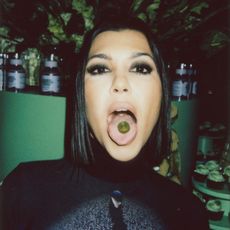 ICYMI, Kourtney Kardashian Barker's Supplement Line Is Now Available on Amazon
ICYMI, Kourtney Kardashian Barker's Supplement Line Is Now Available on AmazonLemme try it.
By Katie Berohn
-
 Dr. Shereene Idriss Gives Us the Brutal Truth About Skincare Myths
Dr. Shereene Idriss Gives Us the Brutal Truth About Skincare MythsThe famous #PillowTalkDerm gives us her inside scoop.
By Marie Lodi
-
 Alana Haim Is Ready for Her Close-Up, Mr. Anderson
Alana Haim Is Ready for Her Close-Up, Mr. AndersonThe seasoned musician shines in her big-screen debut.
By Drew Elovitz
-
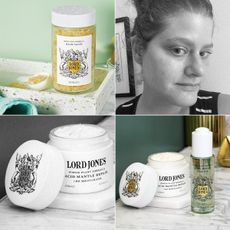 I Recommend These 10 Lord Jones CBD Products to All My Friends
I Recommend These 10 Lord Jones CBD Products to All My FriendsIt's the CBD to the stars.
By Lindy Segal
-
 The Best Sleep Supplements to Help You Drift Off—and What to Know Before Trying
The Best Sleep Supplements to Help You Drift Off—and What to Know Before TryingFor when counting sheep just doesn’t cut it.
By Lindy Segal
